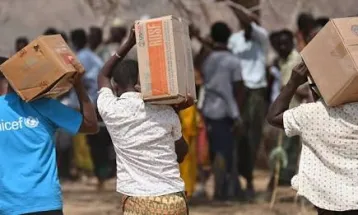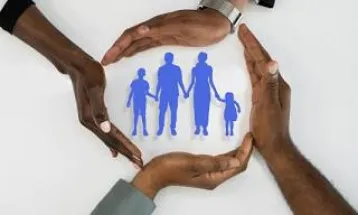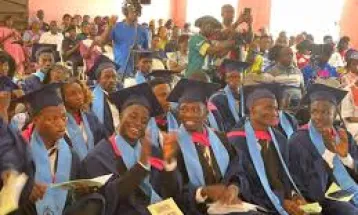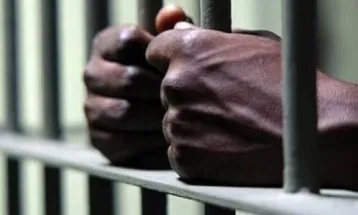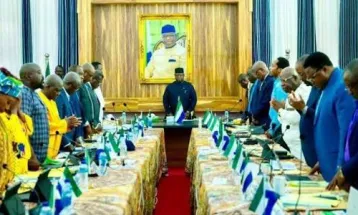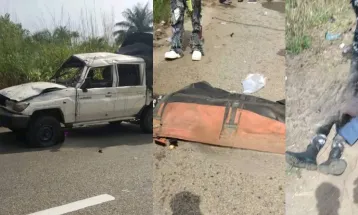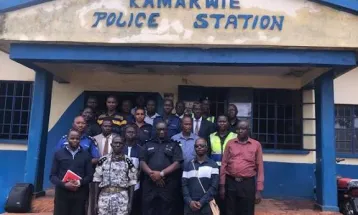Statement by SLAJ President, Ahmed Sahid Nasralla
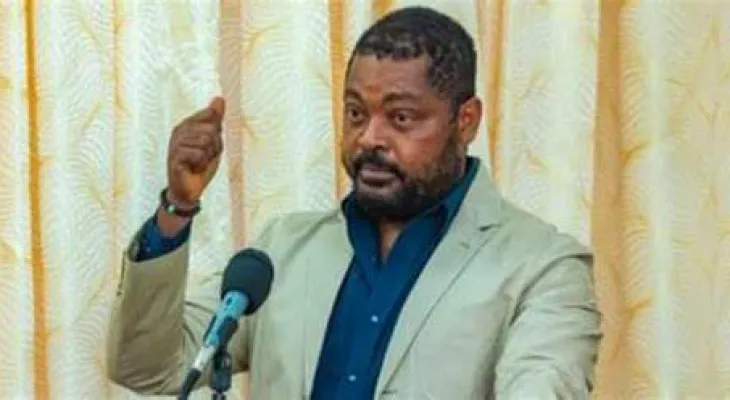
Today, May 3, 2023, SLAJ joins the rest of the world in commemoration of World Press Freedom 2023 as we take stock of the situation of press freedom in our respective countries, looking at the successes, challenges, and future.
In Sierra Leone, the environment is relatively free, safe, and conducive to being a journalist.
There is no journalist detained or in prison for doing their work.
The media is diverse with about 530 media houses- 240 newspapers, 228 radio stations, 25 television stations, 25 magazines, 11 DSTV and DTH services all registered with the Independent Media Commission (IMC).
According to the IMC almost every month the Commission receives an application for the registration of a media company.
However, to further assess the level or degree of press freedom in the country, let us put it into context:
- LEGISLATION
The biggest achievement in terms of legislation in the last three years is the historic repeal of the Criminal and Seditious Libel Law in 2020.
Since the repeal, there has been a drastic decrease in arbitrary arrests and detention of journalists by the Sierra Leone Police (SLP) for publications that are critical of the government or of high-placed public officials or politicians.
Because of the repeal also, Sierra Leone scored progressively in the World Press Freedom Index of 2021 and 2022 moving about 29 places up the world rankings. However, we have dropped 28 places down from 46 in 2022 to 74 in the 2023 global ranking.
This drop may have to do with the passing the following year of the Cyber Security and Crime Act 2021, which many people including journalists perceived as taking back most of the freedom gained through the repeal of the criminal libel law. This year's ranking shows a drop in almost all the indicators including security, legislative, and economic.
Though SLAJ contributed to the passing of the cyber law by submitting a position paper that supported the legislation to promote responsible use of cyberspace and guard against serious virtual crimes like money laundering, illicit financing, terrorism, cyberbullying, etc., the Association raised concerns that certain sections in the Act, especially Section 44, have the potential to undermine press freedom and freedom of expression of ordinary citizens.
Since the passing of the Act, there have been several arrests and detentions of citizens and journalists under the law but none of those cases was actually tested by a trial that was concluded.
We continue to raise those concerns as we approach the June 24 elections.
There is also the Civil Defamation Act of 1961 which can be used by aggrieved persons or entities to seek redress in a court of law if they don't want to complain to the IMC. We have raised the concern that the law is not only archaic but also gives a Judge in a civil libel suit immense discretionary powers to determine the fine if a journalist or a media house is guilty of libel.
In addition, the Parliament of Sierra Leone recently passed two regulations to strengthen the IMC and one for the Right to Access Information Commission (RAIC). The two IMC regulations are: Regulations on Print and Electronic Media and two, the Regulations on Elections Reporting.
SLAJ believes these regulations are meant to promote responsible, professional, and ethical reporting by journalists and media houses at all times.
Nevertheless, online platforms operated by Sierra Leoneans in the Diaspora, and publishing to audiences in the country, are largely outside of the regulatory fence of the IMC.
- POLITICAL
The media in Sierra Leone are largely independent but mostly polarised along the two main political parties- the ruling Sierra Leone People's Party (SLPP) and the main opposition party All People's Congress (APC).
Politicians are by law not allowed to own media houses but they bankroll many of the media houses and are the actual beneficial owners. This is due mainly to the poverty of the media.
The majority of the media in Sierra Leone are owned by journalists themselves and they are mostly one-man businesses even though they are registered as companies limited by guarantee with the Corporate Affairs Commission. They lack financial resources and inadequate management systems which make them difficult, if not impossible, to sustain or grow. Thus they become vulnerable to politicians and big businesses that have the resources.
In addition, there is a worrying trend with many journalists openly identifying with political parties and their top candidates in the hope that when these parties assume power they will be compensated with lucrative appointments.
This trend is undermining independent and public interest journalism which a struggling country like Sierra Leone is in dire need of.
While SLAJ does not condemn any journalist for supporting a political party, because they have the right to do so, we continue to encourage our colleagues to do so with responsibility and professionalism, and to be aware of the great personal risk that comes with that.
- ECONOMIC
The economic situation of the media is becoming unbearable day by day as prices of raw materials used by the print media especially continue to spike unchecked, and advertising which is the life-blood of the media is hard to come by these days as the small private sector continues to shrink.
The Coronavirus pandemic and the Ukraine-Russia war have had a huge toll on the economy of the country and by extension every sector including the media.
Media houses are literally struggling to survive; some have downsized operations and laid off some staff.
If not for the sustained advert support from Mercury International, Africell and Orange, and some banks- especially Rokel Commercial Bank and Sierra Leone Commercial Bank- most of the media houses would have closed down.
Ironically, the government has always been the biggest advertiser. Still, they are also the biggest debtor to the media with huge sums written off as bad debts by the media annually. Moreover, media houses that are pro-government are the ones generally benefitting from government advertisements.
Following the repeal of the criminal libel law, the government with support from the BBC Media Action and other partners including SLAJ convened a National Media Viability and Investment Conference to promote public interest media and investment in the media in Sierra Leone. Sierra Leone is now a beneficiary of a grant of 100 thousand US dollars from the International Fund for Public Interest Media to set up structures for a local National Fund for Public Interest Media to which the government has pledged to commit counterpart funding. A Multi Stakeholders Board headed by SLAJ has been established to provide oversight for the fund as well as a Technical Working Group to administer the fund through the MRCG.
In the area of the welfare of journalists, salary and conditions of service are still unsatisfactory for most journalists and media workers. The truth is the media houses cannot give what they don't have.
However, with the passing of the new IMC Act in 2020 it is now a statutory obligation for media employers to pay their staff above the minimum wage, and their social security contributions. If media houses fail to comply their annual licenses will not be renewed by the IMC.
SLAJ is continuing to engage with the Sierra Leone Reporters Union to address their welfare concerns.
- SAFETY & SECURITY
In the area of safety and security, we have made some remarkable progress but there is still a lot more to be done.
Following the repeal of the criminal libel law, we signed an MoU with the security sector under the umbrella of the Office of National Security (ONS). The MoU seeks to promote mutual understanding, respect, collaboration, and support between the media and the security sector to minimise incidents of physical assault of journalists in the line of duty.
Last month, the SLP funded a 2-day training for journalists and operational commanders of the police force to enhance understanding of the work of both sectors ahead of the June 24 elections.
Beyond that, SLAJ and the Media Reform Coordinating Group (MRCG) have conducted several training and workshops on the safety and security of journalists in the country.
These have led to the formulation of a national framework/policy and the establishment of a National Coordination Committee for the Safety and Security of Journalists in Sierra Leone, comprising representatives from media stakeholders, civil society organisations, the security sector, religious and traditional leaders, and the Judiciary of Sierra Leone.
Nevertheless, there are still concerns around physical assaults, destruction of equipment of journalists in the line of duty, intimidation, online attacks, and death threats, according to a study by the MRCG.
The main perpetrators, according to the study, are the police, political party supporters, and traditional authorities.
- THE NEW MEDIA
Social media continues to threaten the existence of legacy media as well as the peace and stability of the country.
Assessment studies of the information landscape show that the spread of disinformation, fake news, and hate speech on social media and offline to local communities by word of mouth through influencers and trusted voices is largely responsible for violent incidents in the country in the last two to three years, including the infamous August 10th violent protests that claimed the lives of innocent civilians and police officers.
Citizens are becoming increasingly exposed to problematic content influencing them to make wrong decisions and actions.
THE JUNE 24 ELECTIONS
In light of the forthcoming public elections, SLAJ has positioned itself to not only play a central role but to also set the agenda for the elections.
With support from a number of partners: NDI, NED, Irish Aid, FCDO, EU through IDEA International, UNDP, and the ECSL, we are doing the following:
- i) Training of journalists across the country on conflict and gender-sensitive reporting to ensure journalists help to minimise political tension and promote women politicians during the elections.
- ii) Training of journalists on the Proportional Representation system to enable them sensitise the public and politicians about the new system.
iii) Combating disinformation, fake news, and hate speech during the elections to ensure citizens have increased access to accurate, credible, and reliable information during the elections.
- iv) Embark on media literacy to help citizens understand how news is produced in a professional manner and how to consume news in a bid to limit the spread of problematic content.
- v) SLAJ is leading a Committee of 11 member organisations - the National Political Debates Committee (NPDC)- to organise the presidential debate for the leading political parties to promote dialogue among candidates and issue-based conversations around the elections.
WORLD PRESS FREEDOM DAY 2023
Finally, in commemoration of World Press Freedom Day 2023 SLAJ and the MRCG, with the support of the EU, will launch the Media Manifesto 2023 with the theme: 'The MEDIA WE WANT' on 26th of May 2023. The leaders of political parties contesting the June 24 elections are expected to commit to the media manifesto as part of their parties' manifestos.
Let me now take this opportunity to remember all journalists who have lost their lives and those who are in incarceration in trying to bring information to the public.
Long live press freedom!
Long live freedom of expression.
I thank you.
Mohamed Diallo

